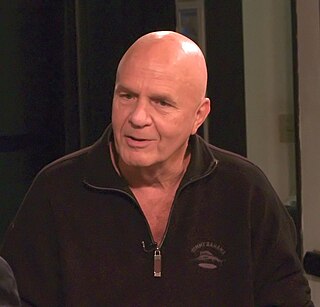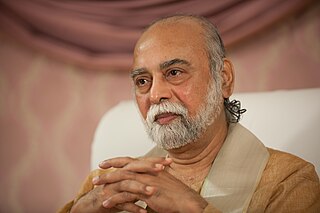
In Hinduism, kundalini is a form of divine feminine energy believed to be located at the base of the spine, in the muladhara. It is an important concept in Śhaiva Tantra, where it is believed to be a force or power associated with the divine feminine or the formless aspect of the Goddess. This energy in the body, when cultivated and awakened through tantric practice, is believed to lead to spiritual liberation. Kuṇḍalinī is associated with the goddess Parvati or Adi Parashakti, the supreme being in Shaktism, and with the goddesses Bhairavi and Kubjika. The term, along with practices associated with it, was adopted into Hatha Yoga in the 9th century. It has since then been adopted into other forms of Hinduism as well as modern spirituality and New Age thought.

In many religious and philosophical traditions, the soul is the non-material essence of a person, which includes one's identity, personality, and memories, an immaterial aspect or essence of a living being that is believed to be able to survive physical death. The concept of the soul is generally applied to humans, although it can also be applied to other living or even non-living entities, as in animism.
Moksha, also called vimoksha, vimukti, and mukti, is a term in Hinduism, Buddhism, Jainism, and Sikhism for various forms of emancipation, liberation, nirvana, or release. In its soteriological and eschatological senses, it refers to freedom from saṃsāra, the cycle of death and rebirth. In its epistemological and psychological senses, moksha is freedom from ignorance: self-realization, self-actualization and self-knowledge.
Surat Shabd Simran is a type of spiritual meditation in the Sant Mat tradition.

Wayne Walter Dyer was an American self-help author and a motivational speaker. Dyer completed a Ed.D. in guidance and counseling at Wayne State University in 1970. Early in his career, he worked as a high school guidance counselor, and went on to run a successful private therapy practice. He became a popular professor of counselor education at St. John's University, where he was approached by a literary agent to put his ideas into book form. The result was his first book, Your Erroneous Zones (1976), one of the best-selling books of all time, with an estimated 100 million copies sold. This launched Dyer's career as a motivational speaker and self-help author, during which he published 20 more best-selling books and produced a number of popular specials for PBS. Influenced by thinkers such as Abraham Maslow and Albert Ellis, Dyer's early work focused on psychological themes such as motivation, self actualization and assertiveness. By the 1990s, the focus of his work had shifted to spirituality. Inspired by Swami Muktananda and New Thought, he promoted themes such as the "power of intention," collaborated with alternative medicine advocate Deepak Chopra on a number of projects, and was a frequent guest on the Oprah Winfrey Show.
David Deida is an American author who writes about the sexual and spiritual growth of men and women. His ten books have been published in 25 languages. He conducts spiritual growth and intimacy workshops and is one of the many founding associates at the Integral Institute. He has conducted research and taught classes at the University of California at Santa Cruz, Lexington Institute in Boston, San Jose State University and Ecole Polytechnique in Paris. He is the author of numerous essays, articles, and books on human spirituality including The Way of the Superior Man, Finding God Through Sex, and Blue Truth and the autobiographical novel Wild Nights.

Llewellyn Vaughan-Lee is a Sufi mystic and lineage successor in the Naqshbandiyya-Mujaddidiyya Sufi Order. He is an extensive lecturer and author of several books about Sufism, mysticism, dreamwork and spirituality.
This is a glossary of spirituality-related terms. Spirituality is closely linked to religion.

Adyashanti is an American former spiritual teacher and author from the San Francisco Bay Area who offered talks, online study courses, and retreats in the United States and abroad. He is the author of numerous books, CDs and DVDs and, together with his wife Mukti, is the founder of Open Gate Sangha, Inc., a nonprofit organization established in 1996 which supports and makes available his teachings.

Vernon Linwood Howard was an American spiritual teacher, author, and philosopher.
John-Roger Hinkins was an American author, public speaker, and founder of the Movement of Spiritual Inner Awareness (MSIA), as well as several other New Age, spiritual, and self-help organizations.

In Tibetan Buddhism, the Three Jewels and Three Roots are supports in which a Buddhist takes refuge by means of a prayer or recitation at the beginning of the day or of a practice session. The Three Jewels are the first and the Three Roots are the second set of three Tibetan Buddhist refuge formulations, the Outer, Inner and Secret forms of the Three Jewels. The 'Outer' form is the 'Triple Gem', the 'Inner' is the Three Roots and the 'Secret' form is the 'Three Bodies' or trikāya of a Buddha.
The Great White Brotherhood, in belief systems akin to Theosophy and New Age, are said to be perfected beings of great power who spread spiritual teachings through selected humans. The members of the Brotherhood may be known as the Masters of the Ancient Wisdom, the Ascended Masters, the Church Invisible, or simply as the Hierarchy. The first person to talk about them in the West was Helena Petrovna Blavatsky (Theosophy), after she and other people claimed to have received messages from them. These included Helena Roerich, Alice A. Bailey, Guy Ballard, Geraldine Innocente, Elizabeth Clare Prophet, Bob Sanders, and Benjamin Creme.
Self-realization is a term used in Western psychology, philosophy, and spirituality; and in Indian religions. In the Western understanding, it is the "fulfillment by oneself of the possibilities of one's character or personality". In Jainism, self realization is called Samyak darshan in which a person attains extrasensory and thoughtless blissful experience of the soul. In the Hindu understanding, self-realization is liberating knowledge of the true self, either as the permanent undying Purusha or witness-consciousness, which is atman (essence), or as the absence (sunyata) of such a permanent self.
Waking Down in Mutuality (also known as WDM, Waking Down) andTrillium Awakening, are a set of spiritual teachings and a community that seek to support the integration of spiritual awakening into ordinary human life. Waking Down and Waking Down in Mutuality are registered trademarks of Saniel Bonder and Linda Groves-Bonder. The teachings are also offered through the Trillium Awakening Teachers Circle, a non-profit association of autonomous teachers.

John de Ruiter is a Canadian spiritual leader and author who conducts meetings in Edmonton, Alberta and abroad. He operates a centre called the College of Integrated Philosophy and conducted his seminars and lectures from the Oasis Centre in west Edmonton from 2007 to 2021, when it was sold to the Aga Khan Foundation for $6,650,000.

Kalki Bhagawan, also known as Sri Bhagavan, is a spiritual teacher from India. He is the founder of a spiritual organization called Oneness. which has its headquarters in Varadaiahpalem, Tirupati district in Andhra Pradesh.

Leonard Jacobson is a spiritual teacher and author living in Asheville, North Carolina

Muhammad Iqbal was a prolific writer who authored many works covering various fields and genres such as poetry, philosophy and mysticism. His philosophical writings and poetical works had a notable impression on the religio-cultural and social revival of the East particularly subcontinent Muslim. The central theme of his philosophical thought throughout his works, prose and poetry, especially in The Secrets of the Self,The Secrets of Selflessness and Message from the East is the Doctrine of Khudi. As a Muslim sage he realized that the revival of man both as an individual and as a member of social group can only come from the ultimate central principle of his being, namely, the Self or Khudi. His knowledge convinced him that the decadent condition of Muslims was due to those philosophical systems which regard the world as a mere illusion not worth striving for, and to certain classes of Sufis who regarded self-annihilation as the highest goal of human life. He use of term Khudi is synonymous with the world of Ruh as mentioned in the Quran. To him the main purpose of the Quran is to awaken in man "the higher consciousness of his manifold relations with Allah and the universe". In his opinion the undeveloped condition and the miserable plight of the Muslim nations were due to lost real identity of Khudi and to keep distance from the true spirit of Islam. Iqbal's ideal for individual as well as social life is Self-affirmation not Self-negation which was the common teaching of Hindu intellectualism and Sufi pantheism. Hence Iqbal tried to establish a firm theoretical foundation for his viewpoints, and to discover a proper philosophical terminology for conveying his message to all the humanity. To Iqbal Khudi is a universal and comprehensive reality with different degrees in expression, which moves perfection. Various factors and principles-which are mostly the same positive and negative religio-moral qualities can strengthen or weaken Khudi in human beings until it reaches the highest stage of perfection, that is, Vicegerency of God on earth. Iqbal, therefore, condemned the doctrine of dissolution of the human self into the featureless Absolute as an Ideal of inaction and poverty of life, and developed his own doctrine based on self-affirmation under the unique name of Khudi. According to him:
- Khudi is a reality neither an abstract thought nor an idea that reveals itself as a unity of what we call mental states. Mental states does not exist in mutual isolation. They mean and involve one another. They exist as phases of a complex whole, called mind. To Iqbal, inner experience is the ego or Khudi at work. In deed our appreciation of the ego itself in the act of perceiving, judging and willing depends ultimately on the conviction that Khudi is real and is not merely an illusion of the mind.
- Khudi is a universal and multi-degree reality. There is a gradually rising note of egohood in the whole universe which differs in degree among the creatures. We are conscious of this in our own self, in nature before us and in the ultimate principle, of all life, the Ultimate Ego.
- Khudi is the gauge of the degree of reality of any living organism. In the scale of life the status of every object is fixed according to extent it develops its Khudi and gains mastery over the environment. Khudi attains highest development in man and here it becomes Personality.
- Khudi is not an independent reality. God the Infinite Khudi, is the Source of life for the finite Khudi which can maintain its existence only as long as it is in contact with this All-embracing Divine Khudi. This Khudi, born in the heart of the Infinite Khudi developing in Him, and yet distinct from Him, unable to exist without Him, but also unable to be non-existent in His presence.
- Khudi in human beings is individual and uniqueness. Iqbal says that our pleasures, pains, desires and experiences related to different things and persons which are exclusively ours, forming a part and parcel of our private Khudi alone. It is this unique interrelation of our mutual states that we express by the word ‘I’.
- Khudi is not a datum; it is an achievement. Khudi has the quality of growth as well as the quality of corruption. To Iqbal if Khudi does not take the initiative, if he does not evolve the inner richness of his being, if he ceases to feel the inward push of advancing life, then the spirit within him hardens into stone and he is reduced to the level of dead matter. The greater man's distance from God, the less his individuality.
- The highest stage of development of Khudi is not self-negation-Fana but self-affirmation-Baqa. The fully developed Khudi does not dissolve even when the Reality is seen face to face as in mystic experience. He who comes nearest to God is the completes person. Nor that he is finally absorbed in God. Fand to Iqbal is not in the meaning of annihilation of Khudi but according to the Prophetical tradition, Takhallaqu bi-Akhlaq-i-Allah, it is essentially the annihilation of human attributes and their substitution by Divine ones.Thus man becomes unique by becoming more and more like the most unique Individuality.
- The basis of Iqbal's doctrine of khudi is a strong faith in the evolution of man. To Iqbal this evolution is to be attained by fortifying Khudi. The most important factors which strengthen Khudi are: Love, desire, Action, Faqr, Courage, Suffering, Tolerance and Forbearance. Khudi in this evolutionary process towards uniqueness has to pass through three stages; Obedience to Law, Self-Control and Divine-Vicegerency.
- By the side of factors and rules which strengthen Khudi, the fully grown Khudi will not be attained unless it associates with other Khudis in the community to which it belongs. So the kind of society in which the greatest scope for the free development of Khudi is provided is of the great importance. According to Iqbal's philosophy of Khudi, a nation is, just as the individual, a Khudi, and has to follow the same lines of conduct as the individual does. Hence the same rules and elements required to flourish the individual Khudi are applied to the community as the national Khudi as well.










